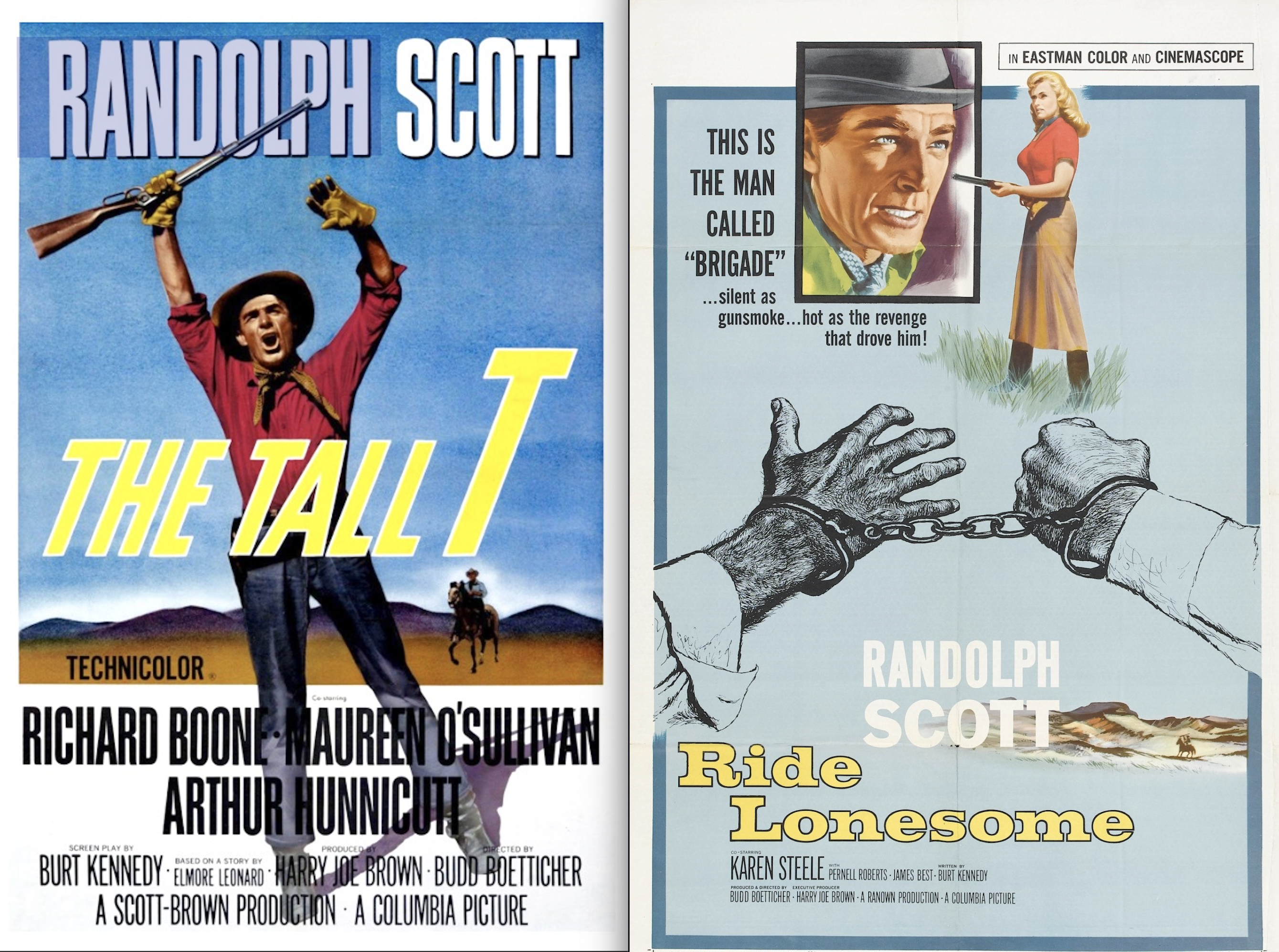
From 1954 to 1960 actor Randolph Scott and director Budd Boetticher (usually with writer Burt Kennedy) made six westerns together which are collectively called the Ranown Cycle. I watched all of them a few years ago. For some reason yesterday morning, I had an image from one of the films – that of a tall, bare tree standing all alone in the center of a grove – and it made me desperate to watch that film again.
I wasn’t quite sure which film it was from, but I made a guess that it was The Tall T (1957) since the tree in question looked like a giant letter T. Turns out I was wrong, but by the time I had figured that out I was already well into rewatching the movie and I didn’t mind finishing it. Then I actually did a little research and determined it was Ride Lonesome (1959) that had that tree and I watched it too.
Boetticher’s direction is a bit like Randolph’s acting – not flashy or particularly nuanced, but good and solid. The films are tricky. They at first seem simple, perhaps too simple, just basic westerns without much to them, but they grow on you. The more I think about them the more I love them.
In The Tall T Scott plays a lonesome rancher who, having lost his horse in a bet while trying to buy a bull steer has to catch a ride with a private coach to the next waystation. The coach is carrying two newlyweds. At the station, he finds not his friend, but three outlaws. They mistake his private coach for the public one which they had planned to rob. Since they have already killed the station’s manager and his young son, they must take the rancher and newlyweds hostage.
The groom tells the outlaws that his wife’s father is wealthy and he will surely put up a big ransom to get her back alive. The film considers this act cowardly. Real men, I suppose, don’t use their wives’ fortunes to get the out of a jam. They would fight their way out. Randolph Scott will do exactly that by the film’s end. The groom will prove his cowardice in other ways and his wife will learn he only married her for her money.
Boetticher keeps things tight. With a run time of just over 70 minutes, there isn’t an ounce of fat on the bone. What’s really interesting about the film, and many of the Ranown Cycle of films is that the villain here has nuance. The leader of the outlaws (Richard Boone) isn’t a bad man. Or at least he isn’t straight-up evil like so many western villains are. He’s just a guy who wound up on the wrong side of the law. By the film’s end, he seems to like Scott’s character more than the guys he’s riding with (including Henry Silva in one of his earliest roles.)
In Ride Lonesome (1959) Scott plays Ben Brigade another lonesome cowboy, and it is fantastic. Here he is a bounty hunter instead of a rancher. As the film begins he’s grabbed Billy John (James Best) a man wanted for murder. Billy John is none too worried though because his brother Frank (Lee Van Cleef) will most certainly rescue him and kill Ben in the process. At yet another waystation Ben finds not the manager but more rifles pointed at his face. The outlaws this time around are Sam (Pernell Roberts) and Whit (James Coburn). They aren’t looking for money or to set Billy John free. Rather they want to turn Billy John in themselves because the bounty includes clemency for any crimes they committed in the past. The men are ready to settle down and want to start with a clean slate.
The three men will work together to get Billy John to town, but Ben says he wants the cash bounty and the other guys say they’ll kill him before they let him screw them out of their amnesty. But as we’ll find out Ben has other things in mind for this journey. The film takes its time letting us know what that other things are, but when it gets there it is a good one.
Karen Steele plays the wife of the waystation manager and she’s as tough as she is beautiful. The film subverts your expectations as a romance doesn’t blossom between her and Ben. Sam does hit on her, and there are more than a few longing gazes that the camera gives her, but unlike so many westerns no one tries to have his way with her.
Boetticher lets the film take its time getting anywhere. He allows the story to come naturally, without rushing it, and it is all the better for it. The first time I watched it, about three years ago, I didn’t love it. I don’t remember why. It probably had something to do with watching all the Ranown Westerns within a few days. I may have grown a bit tired of them by the time I got to this one. But on this viewing I absolutely loved it. Scott is so good in it and the story is really something special.
